
Both the Florida Empowerment Scholarship (FES- UA) and the Personalized Education Program vouchers are designed to help private school and homeschool students.
Private school parents can often use the vouchers towards tuition or to improve their child’s academic skills.
Homeschool parents often use the vouchers to improve their child’s academic performance.
Note, many private schools and homeschool students are what we call neurodivergent right brain learners.
At 3D Learner, we help the neurodivergent right brain learner to improve their academic, executive function and related skills.
We define neurodivergent right brain learners as students who:
- Learn differently – sometimes called neurodivergent, visual, kinesthetic or right brain learners. These students learn best when they see and experience information.
- May have dyslexia, dyscalculia or a learning disability,
- May have ADHD.
- May be on the autism spectrum – especially intelligent students with Aspergers.
- Are often smart enough to succeed but lack some key skills.
In this blog post we will discuss three other ways to leverage both the Florida Empowerment Scholarship (FES- UA) and the Personalized Education Program vouchers.
1- Some homeschool parents want their child to enter private or public schools in the fall. The challenge is their child may be struggling with reading comprehension, math, attention, executive function and/or anxiety challenges. 3D Learner addresses all these issues and more. The May – August time frame is an excellent time to close the gap.
2- A few parents realize their child is too far behind and use the Florida Empowerment Scholarship (FES- UA) and the Personalized Education Program vouchers to close significant gaps utilizing a gap year. This has helped three students to make much more significant gains this year, than they would have made with traditional schooling.
3- Some states offer significant scholarships for students who meet the GPA (Grade Point Average) or SAT – ACT requirements. The Florida Empowerment Scholarship (FES- UA) and the Personalized Education Program vouchers can be used to significantly improve SAT – ACT scores. This allows students to both earn a scholarship that may be worth $20,000 to $29,000 over four years and to get into better colleges or universities. You can read more about this on our blog post in the Bright Futures Scholarship.
If you would like to discuss how we might help your neurotypical, neurodivergent and right brain learners leveraging the Florida Empowerment Scholarship or Personalized Education Program vouchers, call 3D Learner at 561-361-7495 or book a time on our schedule at Let’s discuss the Florida Empowerment Scholarship – Unique Abilities or Personalized Education Program vouchers.
.
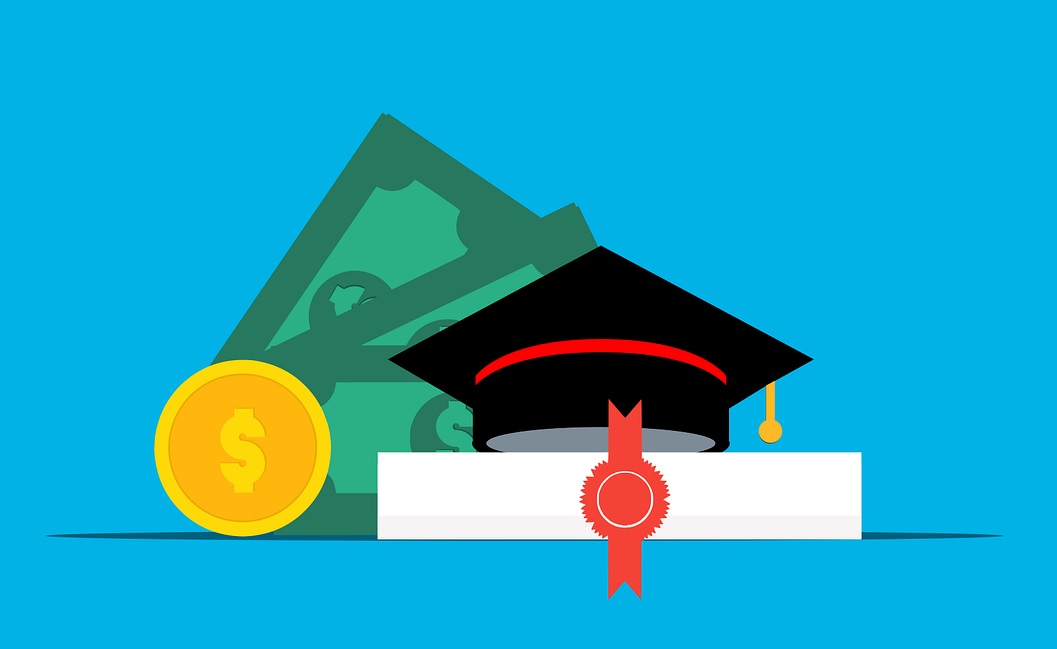
The purpose of this blog post is to alert parents of neurodivergent learners who might not yet have the GPA or SAT – ACT Scores for the Bright Futures Scholarship there may be a chance for your child to still earn the scholarship.
Note, the Bright Futures Scholarship is designed to keep our best and brightest kids in the state university system and to make college affordable for high performing students. The awards are worth approximately $20,000 to $29.000, depending on a student’s GPA.SAT – ACT scores and the tuition at the school they attend.
The Bright Futures Scholarship has two different award levels:
1- The Florida Medallion Scholarship – that requires a 3.0 GPA and a 1210 on the SATs or a 25 on the ACT and 75 volunteer or 100 work hours. This award is worth about $20,000 over 4 years — specifically 75% of the student’s tuition, so the value may vary by school.
2- The Florida Academic Scholarship – that requires a 3.5 GPA and a 1340 on the SATs or a 29 on the ACTs plus either 100 volunteer or 100 work hours.
Reading Comprehension, Reading Speed, Vocabulary and Test Anxiety Are 4 Key Issues we address. Call us at 561-361-7495 to discuss how we assess for these 4 items and how we might be able to help your child earn a Bright Futures Scholarship
3D Learner has helped two groups of students:
- The more traditional learner, who often has the GPA and test scores to qualify for the Florida Medallion Scholarship or the Florida Academic Scholarship. With the increased GPA and SAT – ACT scores, some students have been able to qualify for top universities elsewhere — where they would probably not have qualified without the increased GPA and SAT – ACT scores we helped them get.
- The neurodivergent right brain learner, who may need higher GPA and/or SAT and ACT scores to qualify for the Florida Medallion Scholarship or the Florida Academic Scholarship.
3D Learner helps students in 7 different ways to earn the Florida Medallion Scholarship and the Florida Academic Scholarships:
- We provide an assessment that looks at the present level of performance for reading speed, reading comprehension, vocabulary and executive function.
- We work with the student to set Goals. Since reading comprehension, reading speed, GPAs and SAT and ACT scores are measurable and there are defined targets, this focuses the student’s mind and ours.
- Even students with excellent GPAs often have a reading comprehension level that is below grade level. We have helped these students to improve their reading comprehension 2, 3 and even 4 grade levels.
- We improve reading speed. One student was reading at 125 words per minute and was unable to finish the test or to get test accommodations. We helped him to improve his reading speed to 300 words per minute, while improving his reading comprehension 2 grade levels. This allowed him to finish the test and improve his SAT test scores by 270 points.
- We help students improve their GPAs. This can allow them to qualify for the scholarship, get into better schools and be more successful in college.
- We lower their anxiety. Using both the Safe and Sound Protocol ® and HeartMath ®, our students are able to be much calmer than they would otherwise be.
- We improve their self-esteem and confidence, often by seeing their practice test scores continuously rise.
One student did the math and realized he would have to work over 2000 hours in college to pay for the same amount the scholarship was worth. He created a $20000 check made out to him and put it over his desk. It resulted in a student who was not yet motivated to become highly motivated., We helped him to increase his GPA his last two semesters to a 3.75 and his SAT scores high enough to earn the Florida Medalion Scholarship.
Note, the hard-working student with a high GPA and low-test scores is often the easiest to help. They just need to improve their reading speed, reading comprehension, and math skills, while lowering their anxiety. They often get tricked by the wording on the test and really benefit from our vocabulary building, efforts to improve their math, reading speed and reading comprehension levels; and they become much more confident as we teach them test taking skills.
Neurodivergent Right Brain Learners Often Have Significant Upside Potential
The neurodivergent right brain learner may need more foundation skills.
Who is a neurodivergent right brain learner?
We define neurodivergent right brain learners as students who:
- Learn differently – sometimes called neurodivergent, visual kinesthetic or right brain learners. These students learn best when they see and experience information
- May have dyslexia, dyscalculia or a learning disability
- May have ADHD
- May be on the autism spectrum – especially intelligent students with Aspergers
- Are often smart enough to achieve the Bright Futures Scholarship, but lack some key skills
The neurodivergent right brain learner may appear to be unmotivated, but in many cases money and getting into the right college are motivating.
Our Experience with Neurodivergent Right Brain Learners and the Bright Futures Scholarship
Our initial assessment often uncovers foundational skill gaps that may hamper them in school, on the SAT or ACT, in college and beyond. These might include:
- ADHD issues, where they lose focus when testing.
- Processing speed issues, where they read tortuously slowly.
- Working memory issues where they just do not remember things.
- Language and vocabulary issues. Both the SAT and ACT are written in a tricky way that often confuses the student who does not understand high frequency words (e.g. except, but, greater than, always etc.).
- Math skills, especially with respect to algebra – that is the focus of the SAT and ACT math sections. Combine this with the tricky questions and good students often get scores closer to 500 on the SAT when they should be getting 600 to 650.
- Test anxiety — when one has the other challenges, anxiety often follows.
- Belief in themselves. When a student has always struggled on standardized tests, they often do even worse on the SAT and ACT.
The good news is that with practice, they can often do far better.
If you would like to discuss how we might help your neurotypical, neurodivergent and right brain learners earn a Bright Futures Scholarship or improve their GPA and SAT – ACT scores call 3D Learner at 561-361-7495 or book a time on our schedule at Let’s discuss the Bright Futures Scholarship.

3D Learner offers a tailored, integrated, engaging and effective option that has helped thousands of neurodivergent, right brain and kinesthetic learners from 46 states and 13 other countries.
As Dr. Linda Silverman, the Director of the Gifted Development Center in Denver Colorado said,
”Your program is what many gifted students who learn differently need. I recommend many of the components you use, but you are the first professionals who have so effectively integrated them with your very unique and effective learning system.”
Many smart struggling students get identified with dyslexia, a learning disability, ADHD, and/or Executive Function challenges.
What is often missed is that a large number of these students are neurodivergent, right brain or kinesthetic learners. These students have a sea of strengths and challenges that may include:
- A neurodivergent, right brain or kinesthetic learner who learns best when they see and experience information
- Struggling with phonics, phonemic awareness and/or reading fluency – -may be dyslexia
- Able to focus on that which is interesting and have difficulty paying attention to that which is boring – they may or may not have ADHD.
- Able to remember what they see and experience and have a working memory challenge for what they hear or read
- Slow processors. Processing speed is often a problem that hampers their standardized test scores and frustrated parents and teachers, who expect your child to respond quicker
- Anxiety and frustration
- Suffering from intervention fatigue. They need something different
We recognize that our parents live in many different places and want a program that will work for both their child and them. In this blog post, we share:
3D Learner Options
3D Learner offers parents several unique options including:
- Coming for a one-week intensive program followed up with 10 hours via zoom. We have had students come from California, New York, Texas and many other states — as well as hosting students from 13 other countries.
- For students who live closer, but not close to our office (e.g. elsewhere in Florida, Maryland, New Jersey), students have come for 3 days of intensive training, followed up with 2 days of intensive training 4 to 8 weeks later. We then can do the appropriate follow-up via zoom.
- We have traveled to other places to do training for multiple clients – with Singapore being the place we traveled the furthest.
- We have also helped students solely via zoom – -which works well for some students – although we do prefer a live option. Note, for the very busy parents where travel is not an option, our program may be far better than local options.
If you have a neurodivergent, right brain or kinesthetic learner and want to discuss the options, call us at 561-361-7495 or click here to schedule a Let’s Discuss Creating a Pathway to Success for Your Child.
Here is a screening tool you can use to see if your child is probably a neurodivergent, right brain or kinesthetic learner. We recommend doing this with your child – -their answers may surprise you.
Note, we have had students make dramatic gains including:
- A rising 5th grader from Texas who improved her reading comprehension by 4 grade levels in 6 months, while doubling her reading speed and cutting homework time in half.
- A 7th grader from the State of Washington improved his reading comprehension by 3 grade levels in 5 months and made great strides in all his subjects.
- A student from St Petersburg, FL, went from a C- student to an A student and her ulcer disappeared.
If you have a neurodivergent, right brain or kinesthetic learner and want to discuss the options, call us at 561-361-7495 or click here to schedule a Let’s Discuss Creating a Pathway to Success for Your Child.
3D Learner — Helping Neurodivergent, Right Brain and Kinesthetic Learners Go From Stress to Success in Months
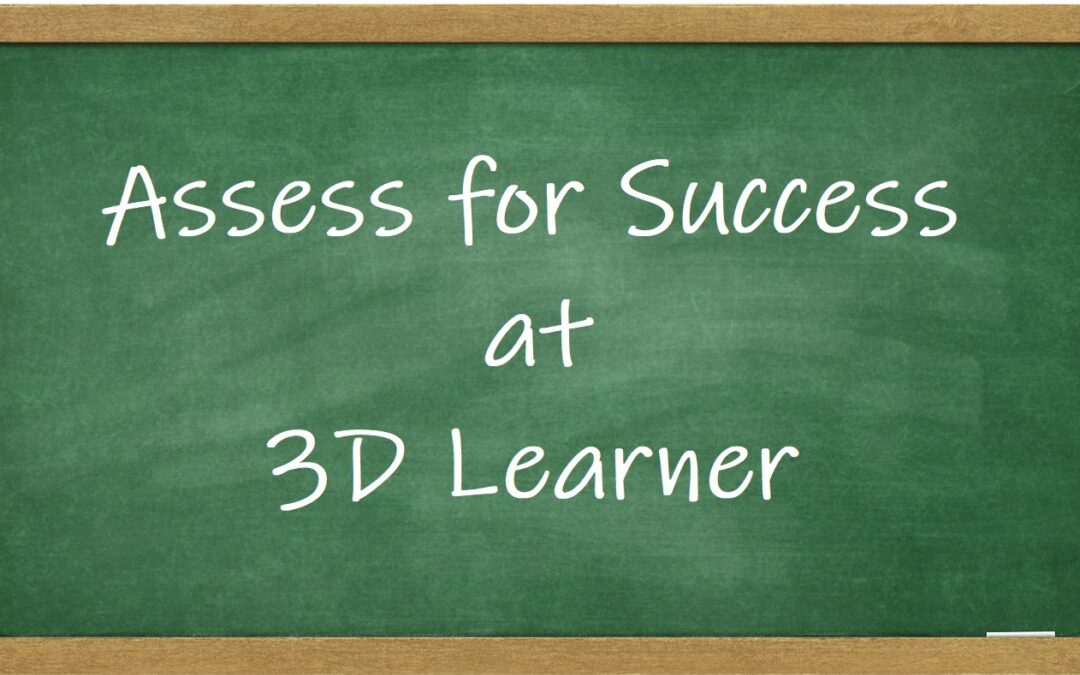
Students today are often struggling with reading fluency, reading comprehension and/or math.
Three of the greatest educational risks are:
- Parents often do not know what their child’s present level of reading fluency, reading comprehension and math skills are at
- Students who learn differently (i.e. neurodivergent, right brain and kinesthetic learners) often fall behind — as neither school based or home school curriculum may be consistent with how they learn best
- Without testing, parents may not be aware of how their child learns best, where their child is strong and where their child struggles
The opportunities for parents include:
- There are real benefits with an assessment that shows you::
- How your child learns best
- What are your child’s strengths and challenges
- What is your child’s present level of performance for reading fluency, reading comprehension and math
- If needed, the assessment can help educators to tailor a program to:
- Capitalize on how your child learns best
- Improve their reading speed, reading comprehension and math skills
- Help you to be the coach your child needs
- How you can help your child be all they can be
How 3D Learner Assesses for Success
Mary called and was not sure about her child’s reading fluency, reading comprehension and math skills were at. She had tried two years of dyslexia treatments. Mary was not interested in labeling, but she was very interested in knowing:
- How her daughter learned best
- What her daughter’s strengths and challenges were
- What was her child’s present level of reading comprehension, reading fluency and math
- If there were significant gaps, could we help her daughter get to grade level or above
- Whether what we offered could improve her child’s baseball and soccer skills. Mary knew that her daughter would be even more interested in help, if it could make her better at baseball or soccer.
Mary shared a few of her frustrations, that included, her daughter:
- Understood stories when Mary read them to her, but struggled with silent reading comprehension
- Read more fluently, but often had difficulty remembering words she had seen and not mastered
- Was good at math, but was now struggling with math word problems.
We then asked Mary what her daughter was good at, Mary shared that her daughter:
- Had an excellent memory for things she had seen and experienced
- Was a good person — who loved playing with younger kids and cared about seniors
- Was good at baseball and soccer but was inconsistent. Three area of concern were:
- Her daughter would sometimes lose focus during a game
- In baseball, she would sometimes hit the ball well, but too often she would pull the ball foul
- In soccer, her shots often went to the right side of the goalie
- Her daughter was frustrated that she was not doing as well as she wanted to
We shared this infographic with Mary and explained how we assess for how the student learns best and whether they have a visual processing, executive function, dyslexia and/or anxiety challenge.
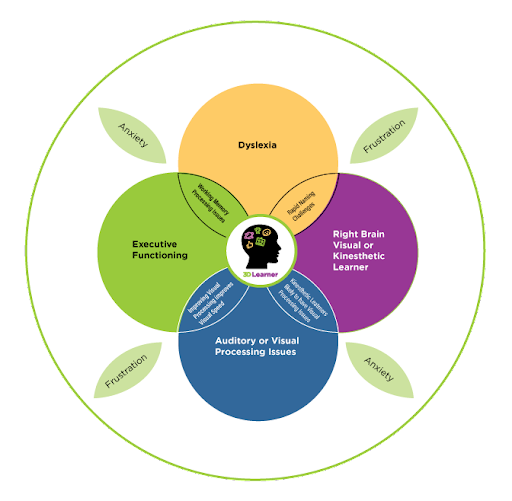
- Many smart struggling kids learn differently. They are often a neurodivergent, right brain or kinesthetic learner, who learn best when they see and experience information. This is important to know, because if they learn differently, it alters the way you teach them, the curriculum you may choose, how you parents them and how one coaches them in sports.
- 74% of the students we see have a visual processing issue – they may see the whole field or the whole room, but their eyes have difficulty converging. This often results in their skipping words and/or liens when reading and having difficulty catching a ball.
- The executive function challenges we often see may include:
- Difficulty sustaining attention and either being hyperactive or impulsive. When we assess a student with the Interactive Metronome ®, we often see that a student’s body moves faster than their brain. In sports, this results in hitting the ball too early. In baseball that would explain pulling it foul or for a right footed kicker, hitting the soccer ball to the right of the goalie. In life, the attention issues may results in a child losing focus when doing work or during a game
- The working memory assessment often shows a student has an excellent visual memory, but has difficulty remembering what they have heard or read
- The Dyslexia Assessment shows where a child is strong and where they struggle. We can assess for Dyslexia and we can also tailor a program that focuses on the key issues
- The reading comprehension assessment shows two different challenges:
- A number of students are below grade level
- Some students are at grade level, but the assessment shows they should and could be well above grade level
- Our math assessment shows us where a student is at and where they struggle
- The anxiety assessment often shows the student gets very anxious in certain situations
Mary asked about the tools we use and whether it is different from what schools and psychologists assess for. We shared that:
- The key assessment tool we use is the Structure of Intellect Assessment ® that shows how a student learns best, where they are strong and where they struggle.
Comments from a principal, a special educator and a psychologist
- A principal asked a special educator why their public school stopped using this assessment. The special educator said “We are required to find a disability in order to provide services. This assessment does not do that. 3D Learner has the luxury of focusing on tailoring a program to help a student succeed
- A psychologist commented, “I wish we could shift our focus from labeling to how to help a child succeed”
- The Visagraph ® we use to show if there is an eye tracking issue can show both the initial challenge and can be used post training to show the results Here is a video that shows a student’s eye tracking before and after training. He commented,. “I now enjoy reading and do much more of it”
- We use the Mindprint Assessment ® developed by by the University of Pennsylvania to assess executive function skills
- We use a Woodcock Johnson ® Reading Comprehensive Assessment
- We use the Core Dyslexia Assessment ® developed by the University of Florida to assess phonics, phonemic awareness and reading fluency. It also helps us to see if the child has dyslexia,
- We use the Perceptions Math Assessment ®
- We use Heartmath ® to assess for anxiety
When we assessed Mary’s daughter we did find that:
- She was a neurodivergent, right brain or kinesthetic learner who learns best when she sees and experiences information
- Her daughter had a number of skills that were well above grade level, but struggled with a few key skills
- She did have a significant visual processing issue
- Attention was an issue and her daughter’s body was racing faster than her mind This explained some of the self-control and sports related issues
- Her visual memory was excellent, but her auditory memory was weak
- She no longer has significant issues related to reading fluency, but there were some areas where she could benefit from additional training
- Her reading comprehension was a year below grade level
- Arithmetic was not an issue, but that word problems were
- Anxiety was an issue
Mary has the flexibility to prioritize training and her daughter was able to make significant gains over the next six months in reading comprehension, math, attention, visual processing, and self-esteem. Her baseball and soccer skills improved too. Mary commented that knowing my daughter was a neurodivergent learner with visual processing and executive function challenges changed everything, and addressing the whole child changed her life. She also added that by helping to improve my daughter’s baseball and soccer skills, you engaged her in the process.
If you would like to discuss your child’s situation and learn more about how we Assess for Success, you can call us at 561-361-7495 or click here to schedule an Assess for Success Conversation. Note, these assessments can be done in person or via zoom.

When a parent is told that their child is at risk of being retained, their initial response is often full of emotion. Frustration, anxiety and even guilt are felt. We can relate to that. As parents and Directors of 3D Learner, we strongly encourage parents to take a proactive approach to helping your child succeed. At 3D Learner our goals are to:
- Help parents realize that third grade retention risks are not your fault.
- There are a number go Good Cause Exemptions to help your child to avoid third grade retention and to be promoted
- Help you be an Informed, Empowered and Proactive parents who:
- Work together to help your child to be promoted
- Understands the depth of your child’s reading comprehension and related issues
- Becomes even more aware of your child’s strengths and challenges
- Partners with your child’s school and the right outside professionals to help your child to make significant gains in their reading comprehension and processing skills, so they are promoted and are much more successful in 4th grade and beyond
If your child is at risk for third grade retention or grade retention in any grade, we encourage you to join us for a presentation on March 13th at 9 pm on:
How to Beat Third Grade Retention or Other Grade Retention Risks by
Improving Reading Comprehension
Click here to register or
Call us at 561-361-7495 to discuss your situation or click here to schedule a
Beat Third Grade Retention by Improving Reading Comprehension Conversation
As one mom said, “How is it that after 5 minutes, you appear to understand my son’s strengths and challenges better than people who have known him for years?”
Our advantage is we have been helping bright right brain learners succeed for 27 years.
5 Key Points About Third Grade Retention
1- There are a number of Good Cause Exemptions that can be utilized to help a child to be promoted. The Florida Department of Education has created a valuable Read to Learn Document that can help you understand your options.
2- Most students facing third grade retention are 1, 1.5 or even 2 years below grade level in reading comprehension. If their reading comprehension issue is not addressed, the student is likely to struggle even more in 4th grade. After 3rd Grade, students are expected to READ TO LEARN; there is no more emphasis on reading instruction in the general classroom. That is the time when math, social studies and science require students to understand what they read. It is also a time when the print gets smaller, the pictures disappear and students with reading comprehension really struggle. Conversely, students who make significant reading comprehension gains by 4th grade have done much better.
3- In a small number of cases, third grade retention is right for a child. The child does not have sufficient all-around foundational skills to succeed in 4th grade. These might include cases where the child has a late summer birthday, they may have learning and attention challenges, and they would be better off not being promoted. This past year, we helped a few students where parents chose to homeschool their child, have a catch-up year, and make the decision about promotion later. In Florida, the Florida Empowerment Scholarship provides parents whose child has a qualifying disability to get around $10,000 a year that can be used for tutoring. For other students, there is a Personalized Education Program scholarship for $8000 that can be used for tutoring.
4- Many students facing third grade retention are right brain, kinesthetic or neurodivergent learners, who learn differently than the way most schools teach. These kids learn best when they see and experience information. They may also have dyslexia and/or working memory, processing speed, attention and/or visual processing issues.
5- By capitalizing on your child’s strengths and addressing their challenges, it is often possible to both beat third grade retention and to position your child to be far more successful in 4th grade and beyond.
Note, we have helped third graders to:
- Beat third grade retention and score well above grade level by 4th grade
- Improve their reading comprehension by 3 grade levels in a year
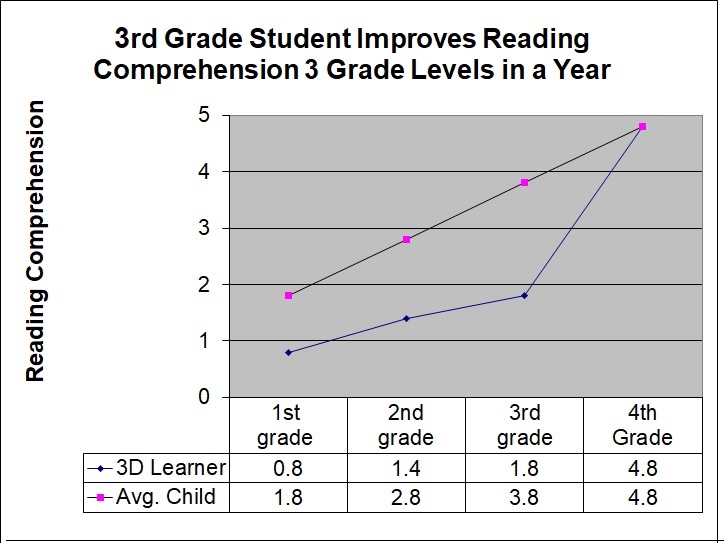
A year later his teacher commented, “He made more progress in a year than any student I have had in 27 years of teaching”
- Improve their academic and athletic skills, boost their self-esteem and lower their anxiety
If your child is at risk for third grade retention or grade retention in any grade, we encourage you to join us for a presentation on March 13th at 9 pm where we will be discussing:
How to Beat Third Grade Retention or Other Grade Retention Risks by
Improving Reading Comprehension
Click here to register or
Call us at 561-361-7495 to discuss your situation or click here to schedule a
Beat Third Grade Retention by Improving Reading Comprehension Conversation

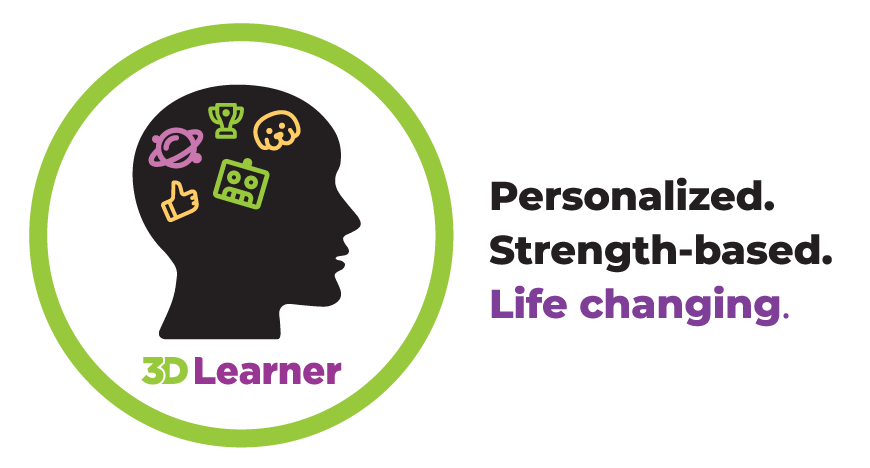
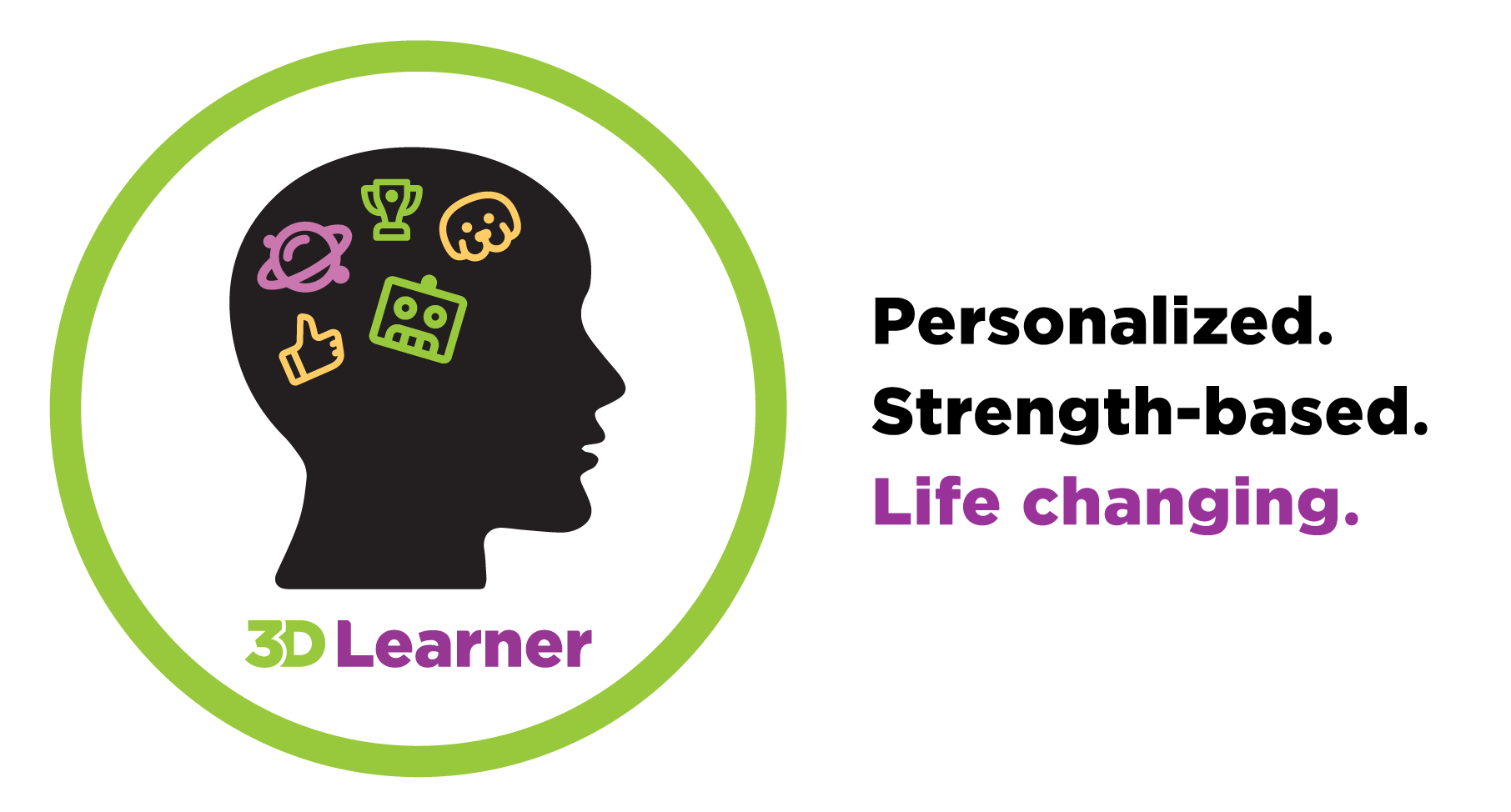






Recent Comments